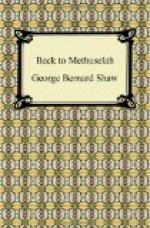In Beethoven’s day the business of art was held to be ’the sublime and beautiful.’ In our day it has fallen to be the imitative and voluptuous. In both periods the word passionate has been freely employed; but in the eighteenth century passion meant irresistible impulse of the loftiest kind: for example, a passion for astronomy or for truth. For us it has come to mean concupiscence and nothing else. One might say to the art of Europe what Antony said to the corpse of Caesar: ’Are all thy conquests, glories, triumphs, spoils, shrunk to this little measure?’ But in fact it is the mind of Europe that has shrunk, being, as we have seen, wholly preoccupied with a busy spring-cleaning to get rid of its superstitions before readjusting itself to the new conception of Evolution.
EVOLUTION IN THE THEATRE
On the stage (and here I come at last to my own particular function in the matter), Comedy, as a destructive, derisory, critical, negative art, kept the theatre open when sublime tragedy perished. From Moliere to Oscar Wilde we had a line of comedic playwrights who, if they had nothing fundamentally positive to say, were at least in revolt against falsehood and imposture, and were not only, as they claimed, ’chastening morals by ridicule,’ but, in Johnson’s phrase, clearing our minds of cant, and thereby shewing an uneasiness in the presence of error which is the surest symptom of intellectual vitality. Meanwhile the name of Tragedy was assumed by plays in which everyone was killed in the last act, just as, in spite of Moliere, plays in which everyone was married in the last act called themselves comedies. Now neither tragedies nor comedies can be produced according to a prescription which gives only the last moments of the last act. Shakespear did not make Hamlet out of its final butchery, nor Twelfth Night out of its final matrimony. And he could not become the conscious iconographer of a religion because he had no conscious religion. He had therefore to exercise his extraordinary natural gifts in the very entertaining art of mimicry, giving us the famous ‘delineation of character’ which makes his plays, like the novels of Scott, Dumas, and Dickens, so delightful. Also, he developed that curious and questionable art of building us a refuge from despair by disguising the cruelties of Nature as jokes. But with all his gifts, the fact remains that he never found the inspiration to write an original play. He furbished up old plays, and adapted popular stories, and chapters of history from Holinshed’s Chronicle and Plutarch’s biographies, to the stage. All this he did (or did not; for there are minus quantities in the algebra of art) with a recklessness which shewed that his trade lay far from his conscience. It is true that he never takes his characters from the borrowed story, because it was less trouble and more fun to him to create them afresh; but none the less he heaps




